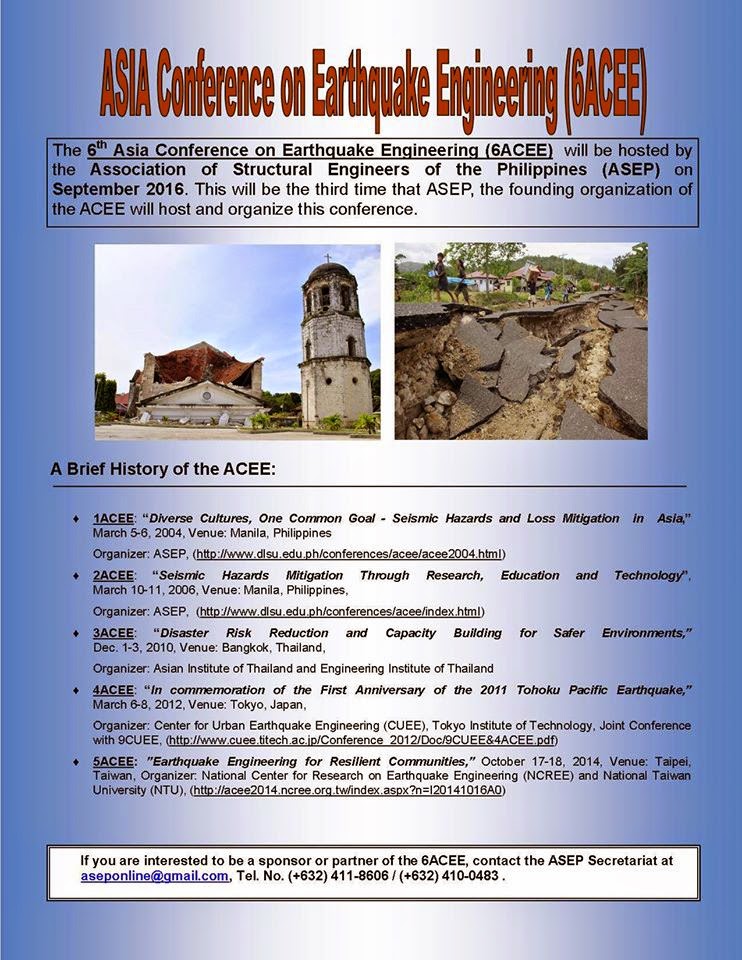The 6ACEE returns to the Philippines and will again be hosted by ASEP on September 22-24, 2016 on the occasion of its anniversary and the 3rd anniversary of the 2013 Bohol Earthquake. The orgainizers plan to hold the 6ACEE at a venue in Cebu City. The theme of the 6ACEE is "Bridging Theory and Practice in Earthquake Engineering for Enhancing Community Resilience."
The ASIA Conference on Earthquake Engineering (ACEE) was founded in 2004 during the term of Engr. Rannie Ison as ASEP President and Cesar Pabalan as VP & conference chair. My DLSU Co-faculty, Joseph Manalo, being the ASEP director and technical committee chair then discussed with me possible themes for the conference. I suggested a thematic international conference where we will invite international experts and professors as members of the scientific committee. We decided the theme on Earthquake Engineering and I quickly emailed my contacts in Japan and other countries such as Prof. Kazuhiko Kawashima (TIT), Prof. Fumio Yamazaki (Chiba U), Prof. Tadaaki Tanabe (Nagoya U), Prof. Panitan (Chula U), Prof. Penung (AIT), Dr. Solidum (PHIVOLCS), Dr, Pacheco (Vibrametrics) and Prof. Pan (NUS) for them to be members. Dr. Pacheco suggested many contacts to be members of the international advisor committee. Their favorable responses led to the birth of the ACEE in 2004. A brief history of the ACCE is summarized below:
- 1ACEE: “Diverse Cultures, One Common Goal - Seismic Hazards and Loss Mitigation in Asia,” March 5-6, 2004, Venue: Manila, Philippines, Organizer: ASEP, (http://www.dlsu.edu.ph/conferences/acee/acee2004.html)
- 2ACEE: “Seismic Hazards Mitigation Through Research,
Education and Technology”, March 10-11, 2006, Venue: Manila, Philippines, Organizer:
ASEP, (http://www.dlsu.edu.ph/conferences/acee/index.html)
- 3ACEE: “Disaster Risk Reduction and Capacity Building for Safer Environments,” Dec. 1-3, 2010, Venue: Bangkok, Thailand,Organizer: Asian Institute of Thailand and Engineering Institute of Thailand
- 4ACEE: “In commemoration of the First Anniversary of the 2011 Tohoku Pacific Earthquake,” March 6-8, 2012, Venue: Tokyo, Japan,Organizer: Center for Urban Earthquake Engineering (CUEE), Tokyo Institute of Technology, Joint Conference with 9CUEE, (http://www.cuee.titech.ac.jp/Conference_2012/Doc/9CUEE&4ACEE.pdf)
- 5ACEE: ”Earthquake Engineering for Resilient Communities,” October 17-18, 2014, Venue: Taipei, Taiwan, Organizer: National Center for Research on Earthquake Engineering (NCREE) and National Taiwan University (NTU), (http://acee2014.ncree.org.tw/index.aspx?n=I20141016A0)
Strategies on how to increase the participation of interested stakeholders from various Asian countries- civil engineers, structural engineers, seismologist, DRRM experts and advocates - must be explored. One suggestion is to involve the various professional organizations interested in earthquake engineering from the various Asian countries to be supporting organizations of the 6ACEE. Hence, we call on these organizations such as the Japan Association on Earthquake Engineering (JAEE), Engineering Institute of Thailand and the professional organizations from Indonesia, Malaysia, Singapore, India, Taiwan, China, Korea and even Australia and New Zealand to support the 6ACEE.












